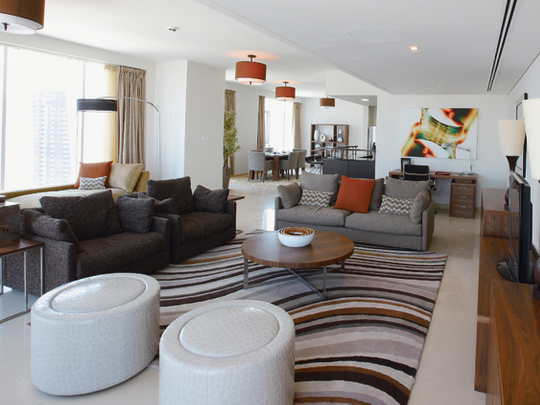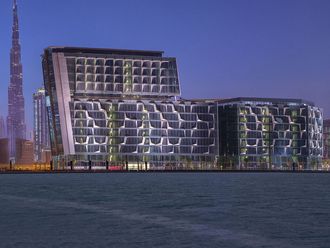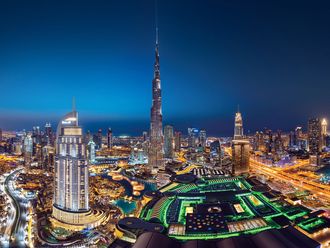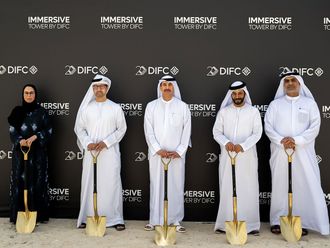
With diminished rental yields in the residential market and continuing supply of inventory unlikely to improve this scenario, serviced apartments with hotel amenities are an alternative being pitched to investors.
With the hospitality sector showing more promise than the residential property market, developers are offering short-term rental schemes for investors interested in capitalising on the leisure and business travel markets.
IFA Hotel and Resorts (IFA HR) is no stranger to the market, with projects in Dubai and across the world firmly positioned in the residential-leisure segment. With resort-style developments in prime holiday areas, its portfolio is vast — from game farms in South Africa to beachside resorts in Thailand and serviced apartments on Palm Jumeirah.
The developer's latest venture, a hotel-residential tower in Jumeirah Lakes Towers (JLT) is a slight departure from the norm. Investors in Laguna Tower's have two options — purchase an apartment and do what they want with it, or convert it into a serviced unit that can be leased to the Mövenpick hotel, which will also occupy the building. Situated in the construction heavy southern end of JLT, currently Laguna Tower is unlikely to appeal to the leisure market. Nonetheless, it is close to the free zone's business centre, Almas Tower — home to the Dubai Multi Commodities Centre — and is well positioned to attract business travellers. Its only competitor is the recently opened Bonnington hotel.
With the building still in the process of being completed, IFA HR has opened two display apartments with an eye to generating more sales prior to phased handovers which will begin at the end of Q3 this year. The hotel's facilities will start coming online between Q4 2010 and Q1 2011.
Mixed-use resort
Piaras Moriarty, vice-president, client management at IFA HR says the tower is a prime example of mixed-use resort real estate. "It has everything — a hotel on the first ten floors and a restaurant and some retail outlets on the ground floor. Then you've got residential on the next 30 levels. The lofts, which are furnished, occupy two loft levels — essentially four floors of 40 units, half of which are sold as wholly owned, the other half sold as a private residence club. Then you've got the penthouse level — with four stunning penthouses, which have their own pools."
Once the project is complete, residents will have access to many of the hotel's facilities. "They'll have services, facilities, licensed restaurants, a business centre, all-day dining, a hotel, concierge service, valet, gymnasium, health centre and a spa," says Moriarty.
As with other IFA HR developments, some services are on a user-pays basis while others are not. "Gyms in many of our projects are pay-as-you-go facilities. This way you can have a much better gym. But if you're not using the gym, you don't have to pay for the services and maintenance of a facility you don't use. But if you choose to pay, you'll get a much better managed facility.
"When we explain this to our purchasers, it makes sense — they're not paying for a facility that they're not going to use. And if they do want that service, they get top-notch services."
IFA HR is offering a private residence club, in which owners agree to use Mövenpick approved decor and furnishings, allowing the units to become available to guests.
In the residential component, it's slightly different. "Here you have a choice — you can buy a unit unfurnished and live in it or you use the Mövenpick approved furniture package and let it out to the hotel. So it's a typical furnished residence and you get a fee every time it's rented out. The bonus is you've got a hospitality operator to back it up, which manages the unit. And because of that, you can generate a higher rental than if it wasn't hospitality managed.
"If you're an owner, you can stay in your apartment then afterwards leave your card at the reception and then it becomes available to be rented out again. So you can generate rental and have access to your property."
"Owners of condo hotel units in Laguna Tower are guaranteed a rental return, based on original purchase price of the unit for the first three years. Thereafter, owners share in the returns by receiving a percentage of the room's revenue after deducting costs. In addition, they get up to 28 days stay free of charge in the unit." Inventory is rotated, he says, to avoid wear and tear on individual properties.
While there's a range of investors, the largest segment is from the UAE or the region. "Many of our owners are business people who live in the surrounding cities and the region and see it as an alternative to staying in a hotel — or for visitors, guests or family. Plus it's an investment."
Prices range from Dh935,000 for a duplex to Dh1.46 million for a high-end sea view loft, while a three-bedroom duplex is Dh2.42 million.
Flexible payment plans are available; Mashreq bank is the project's recommended home financing partner, but there are no restrictions on other mortgage providers.
The service charge has not been finalised, and this will not include the district cooling charges. Part of the reason the company fitted out display apartments early in the process, says Moriarty, was to test them and ensure everything worked.
The three-bedroom duplex unit we visited has floor-to-ceiling windows with sea and lake views, and also overlooks a few buildings still under construction.
Fittings in the apartments are per hotel standard, bedrooms have built-in wardrobes, bathrooms are spacious and minimalist. Units include a plasma TV, wireless phone and all the appliances typical of a serviced apartment. The 1,300ft² loft apartments have floor-to-ceiling windows, which provide sea views for both the living room and the bedroom.
The transition between residential unit and hotel apartment has also been well thought out, as Moriarty explains.
"When an owner enters the building, they can switch the unit from hotel mode to residential mode. In hotel mode, the telephone can transfer a call from reception to the room and the TV gets all the hotel services… with fees involved. But if you're using it for residential, you can just switch off these settings and they're just regular phones and TVs."
Although there have been delays, Moriarty says for IFA HR the overriding priority is quality. "Sometimes you have delays with sub-contractors. But at the end of the day, if you can deliver a superior quality unit to the investor, sometimes it's worth the delay.
"A couple of years ago everyone was in a rush to complete properties and as a result, they were squeezing developers. Now, thankfully, we have more time. This way, they can put more energy and expertise into the job."











